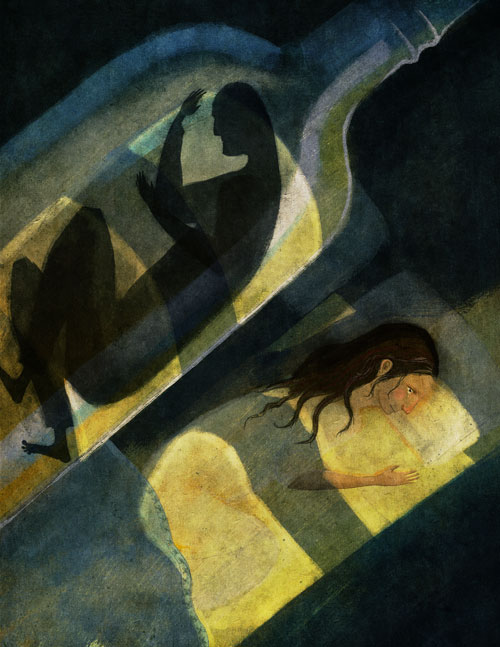SHE WAS FIFTEEN WHEN SHE SAILED ALONE TO AMERICA TO MEET HER INTENDED–TWENTY YEARS HER SENIOR, WHO SHE'D NEVER LAID EYES ON IN HER LIFE.
At the boat, her father, to whom she was the sun, said, “We’ll come over in one month. If you don’t like him, don’t marry him.” She met him and she married him before her parents’ scheduled arrival; unbeknownst to her, her father had perished in the cholera epidemic that swept through Izmir. The relatives she’d come to stay with decided to say nothing so that her wedding day would remain untarnished. But after the ceremony, as she was passing the traditional tray of sweets, she overheard a snippet of something and turned, astonished – lovely in her bridal finery – and said, “My papa is gone?” And then she dropped the tray and fell to the floor in a faint.
Thus, her married life began.
They went to live by the ocean, on the outskirts of the city; she was enchanted with the boardwalk, with the names of the streets: Neptune Boulevard, Mermaid Avenue. He was a smart man, good-looking, but his luck was clumsy; life with him was as much a roller coaster as the one they could see from the windows of their various dwellings. During the years he was involved in bootlegging, their lives were lined with silk: maid service, fittings at the dressmaker’s, guests for dinner in rustling gowns and elegant jackets; she learned to fit a cigarette in its holder and flourish it in the air like a woman in a magazine advertisement. When prohibition ended, they moved to Twenty-third Street and he leased a booth on the boardwalk, but the life of a barker repulsed him; he thought it demeaning to cry his wares to the indifferent crowds, competing for meager sums that might build a fortune. He always seemed to hear the world calling for him and was out the door most of the day and sometimes at night, gathering on the boardwalk with other men from the city of his youth, gathered in the sand around the stars and a bottle. She, meanwhile, raised their children, visited with her mother and sisters, who had come over later, one by one. She never reproached him; instead she managed the bills, the meals, no one ever went hungry. But sometimes at night while the children slept and he was out with his men and his bottle, she watched from a window the path of moonlight that rested on the water and she dreamed of walking on it, all the way across the ocean, to where another life might be waiting.
The boardwalk closed for the winter, booths boarded up, roller coaster silent, sulking in the cold, waiting for warm weather and the clamorous crowds that crammed the streets, the subways, clutching their counterfeit treasures. It was during these seasons of orphaned light that they grew closer; he’d be home at night listening to the radio while she washed the dishes, sometimes grabbing her from behind, dancing her around the kitchen, holding her close as he had in the early days of their short courtship, while the children watched, rapt, from the doorway. Sometimes she’d waken to his arms enveloping her, turning her toward him so that he could trace the map of her face with a calloused finger. At those times she felt remnants of the safety his age and manner had promised when they’d first met and his eyes had been filled with silent promises, and she didn’t think they needed words to reveal their hearts.
But then he’d be laid off from whatever seasonal job he’d taken to get through to the spring and she would work part-time checking coats at The Velvet Slipper night club, watching the women shimmering across the dance floor, the perfumed air making her dizzy with yearning. She would watch and remember the days when she, too, had shimmered, and then she would wonder about the children and how they were growing and what would become of them.
The years went round like the Wonder Wheel that hung high above the boardwalk, shrieks emanating all the way to Twenty-third Street whenever the famous Ferris wheel squealed to a halt and patrons were left swaying in the wind that came off the ocean. He would never escape the prison of his own thoughts, that he was destined for better things, but the bottle had turned the diamonds in his mind to charcoal and the memories of other bottles washing up along the shore, of silvery-scented women and tuxedo-clad men coming up the steps faded as did any drive he once had to reverse his shattered fortune.
She dimly understood his surrender and part of her, but only part, surrendered, too; she worked full-time now, taking coats at The Velvet Slipper, as the children were almost grown and her daughters could help out with the cleaning and shopping and supper. Sometimes she woke up in the middle of the night and felt his coiled restlessness beside her; she thought of reaching around to take his hand, but most often she did nothing. She grew to love sweets – her one selfish pleasure; no gift pleased her more than a one pound box of Zimmerman’s Chocolate Specials, which she devoured after a perfunctory offering to the rest of the family. She lost the slender loveliness that had defined her girlhood but the light never left her face, so that her children and her sisters and even her mother looked to her in times of distress, awed by her ability to still believe that people were good. Once, while trying to comfort a daughter who’d found out her Manhattan lover was married, the daughter turned to her, tear-stained and disheveled, and cried out, “But how can you possibly understand? You’re too good to understand anything!” She was taken aback by this outburst, and then she felt an overwhelming guilt, that she had so successfully hidden her secret thoughts of walking across the water on a moonlit path, leaving them all behind.
It ended in the flat on Twenty-third Street, the years and the bottles having taken their toll, his dreams destroyed like a herd of maimed horses. She sat by his bedside, where they could smell the cotton-candy, salt water-scented air through the windows. He held her hand firmly while he told stories of his own boyhood in Gallipoli, of servants and tutors, things his own children had never had, but still they all gathered on Sundays and listened to him talk because he had never talked this much before to any of them in their lives. Only one daughter rebelled, embittered by it all: “He ignores us our whole lives and now that he’s dying I’m supposed to pretend to feel love?” To which her mother replied, bewildered, “But darling, what else is there?”
And when the end came, when they believed it was finally over, he raised himself from his sweat-stained pillow and said to her, “In case I never told you, in case I never said it before, this life…this life…I could never have done it without you.” She smiled then, and leaned forward and kissed him gently, and suddenly she closed her eyes and grasped his hand tightly, leaving marks on his flesh, and then, slowly, very slowly, she released him. She let him go.
JAGO
Jago has produced illustrations for over 40 books, a couple of TV shows and a few magazines. He has recently finished a book called An Ambush of Tigers that is being published by Millbrook Press in the US. He is also the illustrator of our beautiful cover.
You can buy prints of these illustrations from the artist HERE.
“So these illustrations were a complete departure for me, as a children’s book illustrator it was a wonderful challenge to tackle a more grown up story. I read and re-read the story trying to identify three important moments in the narrative. I sketched various possibilities but in the end I settled on three that really focused on the woman and tried to convey the changing emotions she feels, hope, isolation, yearning…. For some reason her hair became a bit of a theme too, which helped me make her recognisable in each illustration without needing to show her face each time.”
JUDY CHICUREL
Judy Chicurel’s writing has appeared in national and regional publications, including The New York Times, Newsday and Granta. Her new novel-in-stories, If I Knew You Were Going to Be This Beautiful, I Never Would Have Let You Go is out now from G.P. Putnam’s Sons.
You can find out more about her book HERE and you can buy it HERE.
“My grandparents on my father’s side were the impetus for the story; both sets of grandparents were arranged marriages and my father’s mother was fifteen when she came to America to marry my grandfather, whom she’d never met and who was twice her age. They lived in Coney Island and my grandfather died when I was very young, so I never really knew him. He owned a stand on the boardwalk and I used to think it was the greatest thing on earth to go there; I would tell people my grandfather owned the boardwalk at Coney Island because he knew everyone and we would always get free tee shirts and trinkets and tickets for the rides. Growing up, we were more surrounded by my mother’s family, so there was always this bit of mystique about my father’s side. And though it’s an old story, I’m still amazed and touched, whenever I think about my grandmother coming here, so young, and making a life that reached over generations, having children that rose above hard times to forge a better life. It’s not something we might define as a major accomplishment, but it really was.”


